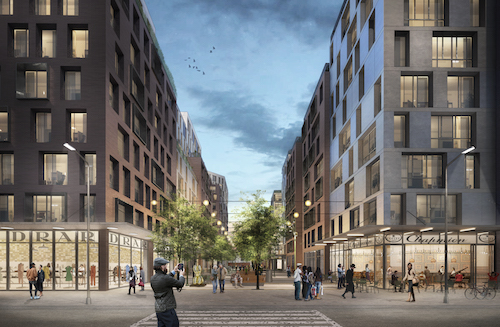The City Council last Tuesday voted to approve the Pfizer Site rezoning project in a vote of 38-6-2. The controversial redevelopment project in Williamsburg has seen opposition since it’s inception due to allegations of a longstanding history of segregation in the Broadway Triangle.
City Council members Antonio Reynoso (D-Bushwick, Williamsburg), Jumaane Williams (D-Flatbush, East Flatbush, Midwood) and Inez Barron (D-East New York) were the only three Brooklyn votes against the project, with the majority of the Council voting in support alongside City Council member Stephen Levin (D-Brooklyn Heights, DUMBO, Williamsburg, Boerum Hill), whose district the project lies in.
The current plan is set in a two-block area situated between Harrison and Union Avenues, from Walton Street to Gerry Street known as the Broadway Triangle area. Developer the Rabsky Group are proposing eight mixed-use buildings for the site including 1,146 mixed-income residential units of which 287 will be permanently affordable units, 65,000 square feet of neighborhood retail, a half-acre of public open space, and 405 parking spaces.

Reynoso and Williams cited the project’s lack of affordable housing in relation to unit sizes as part of the project’s Mandatory Inclusionary Housing (MIH) as a main issue of concern. The project was passed with a restrictive declaration, a covenant running with the land which binds the present owners and all successors. The restrictive declaration placed specific conditions on the future use and development of the Pfizer Site, a concession by the developer Rabsky Group, to quell the fears of the local Latino and Black communities who believe the project favors the local Hasidic community and their large families.
The restrictive declaration will require the 287 units of permanent affordable housing to include no less than 30 percent of 1-bedroom units and 2 -bedroom units and no more than 20 percent of 3-bedroom and 4-bedroom units.
However, Reynoso was quick to note the limitations of the restrictive declaration and to point out the tumultuous history the local community has had with the Rabsky Group.
“There are serious questions about the enforceability of the declaration. The law is what you can get away with, and without a clear and reliable enforcement mechanism, these pledges are not worth the paper they are printed upon. For a document like this to be of any value, it should explicitly acknowledge in its text that tenants, homeowners and community groups surrounding the project have the power to enforce the obligations in court,” said Reynoso.
“Without this, the community will be in the uncertain position of relying upon the City to bring enforcement action against the developer, or—at worst—relying upon the developer’s good faith. The Rabsky Group has previously demonstrated that they cannot be counted upon to act in good faith,” added Reynoso.
In August 2014, Rabsky Group purchased part of the rezoned Rheingold site, a piece of city-land that was rezoned from manufacturing-to-residential. The original redevelopment plan for the site located in Bushwick included an agreement with the then-developer, The Read Group, that included a commitment to develop affordable housing at levels and unit sizes tailored to meet community need, as well as other community benefits, such as: regular communication with the coalition and Community Board 4; a local hiring program and union jobs; a partnership with a local non-profit to market the affordable housing units; and mitigation of construction and traffic impacts.
However, once the piece of land was bought by the Rabsky Group they, according to Reynoso, argued that they were under no obligation to honor commitments to the community and to date have not followed through with any of the original commitments.

Levin was quick to applaud the final proposal, praising the efforts of the Rabsky Group to sign and adhere to the restrictive declaration that will also mandate that they host a series of community workshops to help lottery applicants, notify the community when the lottery opens, ensure that a minimum of 25 percent of the building contracts go to Minority and Women-Owned Business Enterprises (MWBE) and ensure that 25 percent of the workforce is from the local community.
“So, as you can see this application has been thoroughly vetted by this council, by this committee, by myself in addition to the other agencies throughout the ULURP process. We feel strongly that this is not only a fair application to approve but it goes above and beyond what any other application that I have had in my district as a private application when it to ensuring that what they say they’re going to do that they actually do it and with regard to mandatory inclusionary housing,” said Levin.






